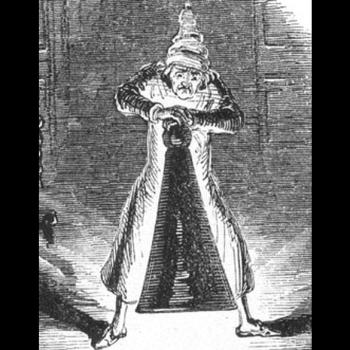~ Would a good Father murder his son and send half his children to eternal torture? ~

You are attending a church class called Fundamentals of the Faith, taught by your pastor. “All children are born in sin and deserve eternal damnation,” says Pastor. “In love, God sacrificed his son on the cross to pay for our sins. Jesus took the punishment that we deserve. Those who acknowledge him as their Lord and Savior will go to heaven while those who don’t will be damned. So you see how God’s plan is, in fact, like a legal contract and the terms are clear. The reward is heaven and the punishment is hell. Now could someone please read Habakkuk 1:13?”
A crackling of pages.
“I have it,” a man says. He clears his throat and begins to read. “Your eyes are too pure to look on evil. You cannot tolerate wrongdoing.”
“God cannot tolerate wrongdoing,” Pastor repeats. “So when Adam and Eve sinned, he rejected them. When Cain killed Abel, God marked him with a curse. God is just and he turns his back on evil-doers. He rejects them. Now under the Old Covenant, God’s wrath was appeased by the sacrifice of animals. Under the New Covenant, God provided a better way, through the blood of his only son. Our sin and shame and the filthy rags of self-righteousness were all crucified with Christ on the cross.” The pastor slowly nods, his hands gripping the lectern. “That’s the Gospel in a nutshell,” he says. “Now before we continue, do you have any questions?”
As you scan the room, you notice that a stranger has slipped into the back of the room.
It’s Jesus, who has visited your church several times lately.
As Jesus drops into a folding chair in the back row, your pastor nods in recognition.
“Ah, Jesus,” Pastor says. “It is good that you are here. We were just talking about the fundamentals of the faith. Were you able to catch the opening statement or would you like a recap?”
“No, I caught it all.” His bright eyes and gentle smile bring a welcome warmth to the chilly atmosphere.
“And do you have any thoughts to add,” asks Pastor, “to supplement our understanding of the fundamentals of the faith?”
Jesus offers a sober nod. “Only one question, Pastor. I was wondering where you learned that, uh … that peculiar twist on the gospel?”
For a moment, your pastor looks like a fish out of water, his lips silently gasping.
“Well, now,” he says, “this is what we call Orthodox Christianity. It’s core theology. These are, uh … these are the central tenants of the faith, passed down to us by the church’s foremost theologians. That’s why I’m surprised to hear you, of all people, call this, um …”
Pastor clears his throat.
“… a peculiar twist on the Gospel,” he says with finality.
In the ensuing interval, all heads turn toward the back of the room.
“And have you never questioned these presumptions?” Jesus asks.
“But Jesus,” says Pastor, stiffening his neck and standing straighter, “we can hardly question the respected men who taught this. To do so would be like … like … like …”
“In my day, it would be like questioning the deeply-rooted beliefs of the Pharisees or Sadducees.”
The pastor cannot hide a momentary look of shock before he regains his composure. “Well, then … what I mean to say is, ah … how exactly would you define the fundamentals of faith?”
Jesus’ face breaks into a beaming smile.
“It’s not nearly as complicated as you make it,” he says. “You can start by ditching that ‘legal contract’ paradigm. Throw out the bit about God rejecting people who fail. That’s like saying a mother rejects her toddler for breaking a teacup! Now tell me,” he says, scanning the room, “what one word sums up all the law and the prophets?”
“Love,” say several people.
“Love,” Jesus repeats. “You see, God didn’t turn his back on Adam and Eve when they turned their backs on him. He pursued them, gave them counsel and even clothed them in their shame and nakedness. He marked their son Cain with a sign of protection, not a curse. Every time his people rejected him, God didn’t reject them. Instead he went to great lengths to restore and forgive. He lovingly pursued them. Where can you go to flee from God, that he is not already there? He will pursue you in love. His love — not his wrath — endures forever.”
As Jesus stands and raises his hands, a collective gasp goes through the room. All eyes are fixed on his disfigured wrists and hands.
“When you look at the cross, you should not see a cruel judge who tortured his beloved son, nor a tyrant who is this close to pouring his vengeance on you.” He measures an interval with his thumb and forefinger. “God would never torture anyone. That was not his brutal plan, to hire assassins to murder his only son. You have it backwards! God wasn’t killing man. Evil men were killing God!”
Jesus pauses to let his words sink in.
“What then was the purpose of the cross,” asks the pastor, “if not for atonement? What was the purpose of the crucifixion if not to bear the punishment that we all deserve?”
“That’s like asking, ‘What’s the purpose of wicked men killing innocent children?’ It’s a senseless and tragic act! To say that God’s “purpose’ was to torture his son implies that he is a wicked father indeed. Likewise, to say he created a hellish place of torment for his children makes him into a monster, not a God of love. The crucifixion was the purpose of wicked men, not of God. And yet it shows how love will conquer evil in the end. It stands as an example of how to respond in love to wickedness. It shows how God’s love will always have the final word.”
Jesus scans the room, his eyes bestowing compassion on each person.
The pastor clears his throat. “Well then,” he says, “if God is not wrathful, what then of hell? You’re not saying it’s a myth, are you?”
“That’s a great question,” Jesus says. “It is not in God’s nature to set up people to fail, causing them to be ‘born in sin’ as you presumed earlier, and then sending them to a place of torture. And yet humans are quite capable of sending themselves to a hell of their own creation.”
A man raises his hand. Jesus acknowledges him with a nod. “Are you saying that humans somehow created the hell described in the Bible as a place of fire and suffering and gnashing of teeth?”
“No, no,” says Jesus, exuding patience and love. “The writers of scripture brought their own cultural biases into the text. For hundreds of years, primitive people embraced the torments of hell in myths and legends. We couldn’t help that the writers of the Bible co-opted these myths.”
The pastor’s brow furrows with deep concern. “That raises so many questions in the arena of accepted theology,” he says. “It makes me wonder what hell is, then, if not a place of fire and torment?”
“The worst torment this God-who-is-love would allow is eternal separation. He is a respectful Father who will not force his rebellious children into fellowship with himself. Some would rather spend eternity running from him than embrace his love. More often than not, they are driven by unforgiveness. They would rather wallow in eternal bitterness than forgive their worst enemy. They say, ‘I will sooner go to hell than spend eternity with those who abused me! No God who forgives them is a friend of mine!’”
Jesus pauses, his eyes toward the florescent lights. Then he begins pacing.
“Why make religion a game of saying the right words for fear of burning? Why treat God like a Santa Claus who is continually checking his list to see who’s naughty and nice? And how did heaven become the goal? Didn’t I encourage you to pursue the heavenly kingdom which is right here among you and your friends? Didn’t I show you how to discover the riches of God’s kingdom among the poor, the sick, foreigners, fatherless, inmates and outcasts?”
Thoughtfully, Jesus turns and walks along the side wall. He pauses to face the class.
“Don’t be so glum,” he says with a laugh. “Your relationship with God is not about rewards and punishments. Your destiny does not depend upon your performance or on the magic words you say before you die. Salvation is so much more than words! It is a vast ocean of life, all wrapped up in that one small word I taught you, which is … ?”
Jesus pauses, sweeping his eyes across the room.
“Love,” you say, along with several others.
“Agape love says it all. God is love. Love is life. Love is the one fundamental of the faith. God’s love stops at nothing. He leaves the 99 good church-goers to pursue the murderer, the addict, the death-row inmate. He gives preferential attention to the oppressed, the fatherless, the rejected queer and trans, the mentally ill, the abandoned immigrant. God’s love preaches life and liberation to the imprisoned souls in Hades. And isn’t that more grace than you ever imagined, to know that death isn’t your last chance to accept God’s gift of life? You presume that death is your last chance of salvation, but why shun all the theologians who believe that God’s love rescues people from hell? The Bible itself teaches that nothing — not even death or hell — can separate anyone from our love.”[1]
In the pensive silence, lines of concern cross Jesus’ brow.
“Faith has been bent into a legal contract. Belief has become a box to tick. You get your heaven biscuit by doing tricks for God before an audience of judges. I ask you, though, do you believe me when I say that God is love? Do you believe me when I say he is a good father in all the ways a child would hope and imagine? Do you believe me when I say that the entire law is summed up by loving God and loving your neighbor?”
Every eye follows Jesus as he talks and walks. He pauses to gently touch a pink bundle cradled by a young mother whose face is beaming.
“Does God love pedophiles and junkies any less than he loves this precious child?”
His eyes scan the room. “God was not frowning at you this morning as you visited websites you ought not to have visited. He did not wag his head at your lost temper yesterday, saying ‘There you go again, you pitiful creature.’ He wasn’t planning a special place in hell for those who used room 221 at the Holiday Inn last weekend. No! There is no condemnation for those who know love! So stop condemning yourselves!”
An uncomfortable silence has settled over the room, broken only by the gentle tap of Jesus’ feet on the linoleum floor.
“I do not accuse you for your cheating, for your hurtful words, for your neglect, for your lies, for that child you secretly abandoned. Yes, I invite you to sin no more. Yes, retribution is appropriate. But know that God will never turn his back on you. Never!”
Jesus turns toward the front of the room. “You offered me the floor, Pastor, and I took it. Now I give it back to you.”
Pastor still has a befuddled look on his face. He extends a hand toward Jesus and says, “I have nothing to add. Thank you, Jesus.”
Light applause fills the room.
As Jesus nods, a boyish grin crosses his face. He broadcasts a beaming face to every woman, man and child.
“I would absolutely love to talk more with each one of you,” he says. “So won’t you join me for refreshments in the back of the room?” The dramatic wave of his hand draws all eyes to a previously empty table that now overflows like a cornucopia with a lavish assortment of pastries, fruit platters, chocolate truffles, wines, juices, nuts, cheeses and crackers.
A collective “Ahhh” of amazement fills the room. People chatter among themselves. Several rise to their feet and follow Jesus to the impromptu banquet.
As you pause to take it all in, you notice — as if for the first time — the Flemish painting that has hung at the back of the room for as long as you can remember. In the portrait, an elated father embraces a boy in tattered rags, while servants deliver rich garments, jugs of wine and a roasted calf on an enormous platter. A caption reads, “The Prodigal Son.”[2]
~~~~~~
“But the father said to his servants, ‘Quick! Bring the best robe and put it on him. Put a ring on his finger and sandals on his feet. Bring the fattened calf and kill it. Let’s have a feast and celebrate. For this son of mine was dead and is alive again; he was lost and is found.’ So they began to celebrate.” — Luke 15:22-24
Image: Return of the Prodigal Son, by Guercino. Public Domain.
[1] For a fascinating creative exploration of this possibility, see: C.S. Lewis, The Great Divorce (New York: HarperCollins, 2015; 1945).
[2] For more on this topic, see:
A More Christlike God: A More Beautiful Gospel, by Bradley Jersak (Pasadena: Plain Truth Ministries; 2016).
Tattoos on the Heart: The Power of Boundless Compassion, by Gregory Boyle (New York: Free Press (Simon & Schuster), 2011).
The Shack: Where Tragedy Confronts Eternity, by William Paul Young (Thousand Oaks: Windblown Media; 2007).
The Great Divorce, by C. S. Lewis (New York: Harper Collins; 2015).












